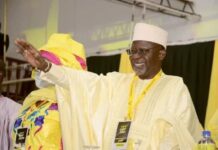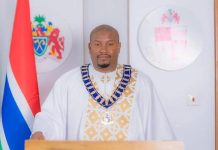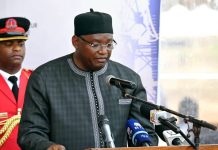By Kebba Mamburay
Citizens’ Alliance (CA) last week held a press conference where it disclosed to the media its continuous engagement with Gambians across the country to sensitize them on the important of voting in the forthcoming election.
December 4 2021, The Gambia will go back to the polls after the dawn of a new dispensation of President Adama Barrow.
Party leader, Dr. Ismaila Ceesay, highlighted the nation-wide tour undertook by CA which started in February 17, 2021, saying it was solely centred on voter registration sensitization tour which is still ongoing.
Dr. Ceesay said the IEC has just announced a date for registration thus they deem it prudent to tour the country and talk to Gambians about the importance of voter registration and why they should register to vote and what they need to do to register.
“We cannot afford to disenfranchise anybody in this very important national electoral process which would take place in a couple of months’ time,” he said.
Ceesay said CA believed that every vote is powerful and every citizen eligible to vote must try to get a voter’s card to vote. He said there is a lot of misconception that one needs only an ID card to vote and people often say they do not have an ID card to vote.
“One needs an ID card as a supporting document. Yes! But if one also has a birth certificate, Gambian passport and an Alkalo’s attestation, certifying that you’re born in that village or district, then he/she is eligible to register and vote,” he said.
Ceesay commended the IEC for announced to commence voter registration on May 29 to July 11. He also implored on journalists to keep sensitizing Gambians on the importance of registering to vote.
“The Gambia has a younger population, who are now interested in politics and want to register, so this is just a preliminary date from the IEC, may be there might be a need for an extension,” he said.
Dr. Ceesay said during their discussions with the people, many communities in The Gambia are facing serious challenges and base on their data collection, access to clean water overshadowed most of the challenges faced by rural communities from Barra and Foni onwards. He said Kombo South, Jarra East, West and Central, Soma Pakalinding, Jinoi, Kabada, etc etc are also facing similar challenges.
Ceesay urged the government to utilize the available resources especially Gambia’s river and underground water resources to ensure “we build the right systems and infrastructure to provide water for our people in rural communities.”
“It is so sad that after 56 years of independence, you go to a particular village of more than two thousand (2,000) people without a clinic or hospital and they have to go about 13 to15 kilometers to access healthcare. Sometimes in a very dangerous terrain, because they are mostly off the roads and the roads are bad. At night, if a pregnant woman wants to give birth, they put her on a donkey cart to travel for kilometers to the nearby clinic to give birth and sometimes they give birth on the road to the clinic,” he explained.
Dr. Ceesay said there are villages without a single water source and people there have to go kilometers away to fetch water. Also, he said other communities do have schools coupled with bad roads.
“There is nothing that people need to live a dignified life and that is so disheartening and I think it’s time for us to really consider rural Gambia and see how we can decentralize development to ensure that we consider people living in the rural Gambia. They are also Gambian, part of The Gambia, therefore it is unfair that if we in the Kombos have access to clean running water, access to health care services, access to education for our children, access to roads and people who are paring for this (farmers) and women gardeners, paying taxes have no access to the most basic necessities. What is the purpose of the state? If a state that cannot provide basic services for over a majority of its population, then that is a fail state,” he said.




















